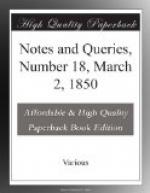Now comes the more difficult point, which alone concerns Dr. Todd in his highly interesting labours upon Wycliffe. And the method which, until better advised, I should be inclined to follow with those passages, is to take the word nearly, though not exactly, in what seems to have been its most usual sense; not indeed for comforters or cherishers, but for those who promote comfort and convenience, viz., ministers or servants. It does not at all follow, because he is blaming the introduction of these persons as expensive, superfluous, and otherwise evil, that he describes them by a word expressive of evil. As a ministering angel would be a reheting angel, so I take a rehetor here to be simply a minister, one who waits upon your occasions and serves you.
A.N.
* * * * *
ARABIC NUMERALS.
The history of the Arabic numerals, as they are generally called, is so mixed up with that of the use of the decimal scale, that they form, in fact, but a single inquiry. The mere history of the bare forms of symbols has, doubtless, its use: but then it is only in the character of materiel for a philosophical discussion of the question—a discussion into which the natural progress of the human mind and the urgency of social wants must enter largely.
It might at first sight appear, from the cognate character of the Hebrew and Arabic languages, that the idea of using a single symbol for each number, might originate with either—with one as likely as with the other. But on reflection it will readily appear that the question rather resolves itself into one respecting the “hand-cursive” of the Jews and Saracens, than into one respecting the constitution of the languages. Of the Jewish we know nothing, or next to nothing, at the period in question; whilst the Arabic is as well known as even our own present style of calligraphy. It deserves to be more carefully inquired into than has yet been done, whether the invention of contracting the written compound symbols of the digital numbers into single symbols did not really originate amongst the Jews rather than the Saracens; and even whether the Arabs themselves did not obtain them from the “Jew merchants” of the earlier ages of our era. One thing is tolerably certain:—that the Jew merchant would, as a matter of precaution, keep all his accounts in some secret notation, or in cipher. Whether this should be a modified form of the Hebrew notation, or of the Latin, must in a great degree depend upon the amount of literary acquirement common amongst that people at the time.
Assuming that the Jews, as a literate people, were upon a par with their Christian contemporaries, and that their knowledge was mainly confined to mere commercial notation, an anonymous writer has shown how the modifications of form could be naturally made, in vol. ii. of the Bath and Bristol Magazine, pp. 393-412.; the motto being valent quanti valet, as well as the title professing it to be wholly “conjectural.” Some of the speculations in it may, however, deserve further considerations than they have yet received.[1]




